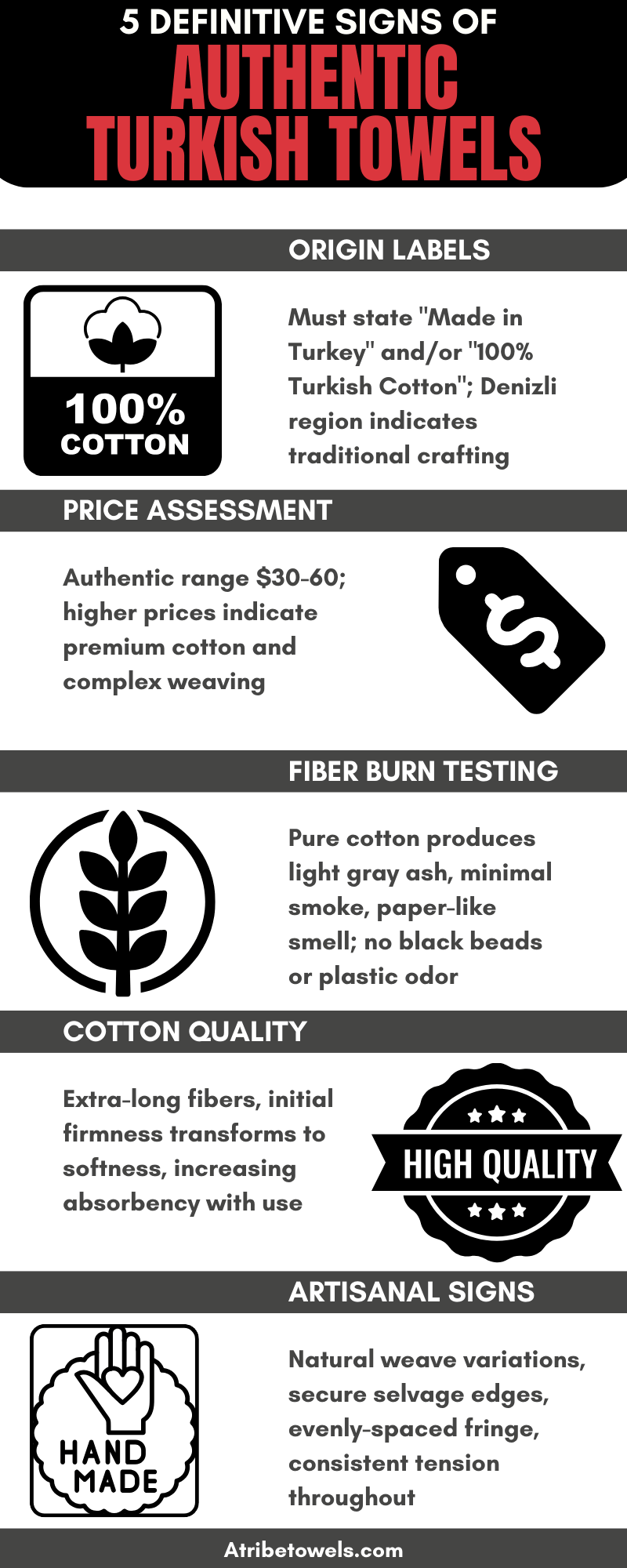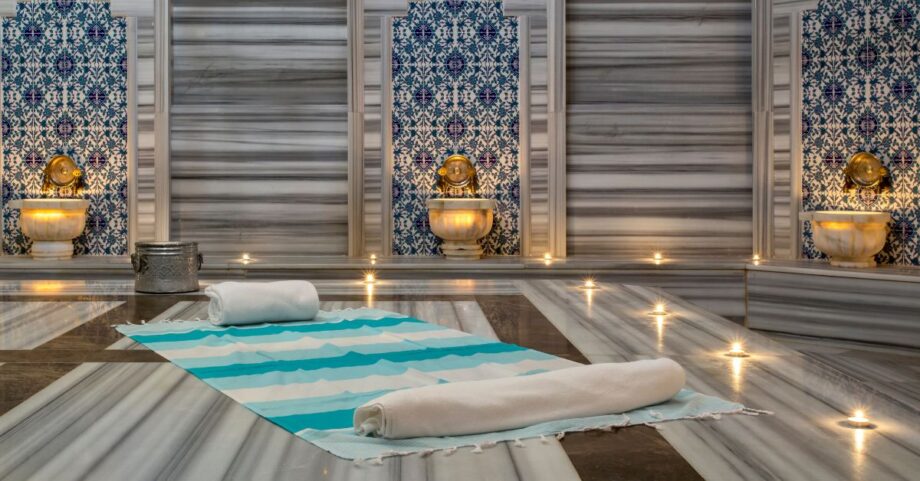Turkish towel exports reached 772.8 million dollars in 2021, showing a 28.17% increase due to unmatched quality and design. Authentic Turkish towels, prized for their exceptional craftsmanship and strategic position in global textile markets, dominate the premium home textiles segment. Understanding their key authenticating features before investing in these distinctive pieces can help ensure you’re getting genuine Turkish quality.
5 Definitive Signs of Authentic Turkish Towels

1. Origin Verification & Labeling
Before going into the specifics, you need to understand that authentic Turkish towels carry distinct markers of their origin. The verification process starts with a careful examination of labels and supporting documentation. Manufacturers who take pride in their authentic Turkish towels provide comprehensive product details which may include one or more of these:
| Label Requirements | What They Indicate |
| “Made in Turkey” statement | Direct confirmation of Turkish origin |
| “100% Turkish Cotton” label | Pure cotton sourcing verification |
| “Aegean Cotton” specification | Premium long-fiber variety |
| Regional indicators (e.g., Denizli) | Traditional craftsmanship center |
Shoppers should exercise caution when encountering vague terminology like “Turkish style” or “Turkish inspired.” These phrases often indicate products that merely imitate authentic Turkish towels. Genuine manufacturers proudly display their Turkish heritage through explicit labeling.
The Denizli region holds particular significance in Turkish towel production. This area has specialized in textile manufacturing for generations, with techniques passed down through families. When a towel indicates Denizli origin, it typically suggests adherence to traditional crafting methods.
2. Price Range Assessment
The cost reflects multiple factors, including material quality, craftsmanship, and ethical production practices.
- Entry-level authentic Turkish towels generally start at $30, representing basic designs with standard cotton grades.
- Mid-range options between $40-50 often feature enhanced weaving patterns and superior cotton quality.
- Premium selections from $50-60 typically incorporate complex designs and highest-grade materials.
Consumers should approach towels priced below $30 with skepticism. These items frequently use mass-production techniques that deviate from traditional Turkish methods. Legitimate manufacturers maintain higher prices to cover quality materials and fair labor compensation.
Higher-end authentic towels command premium prices based on several distinguishing features. Expert weavers often spend additional time creating difficult patterns. The use of certified organic cotton or specialized Aegean varieties increases production costs. Complex geometric designs require more skill and time to execute properly.
While some authentic Turkish towels may exceed the typical price range, buyers should receive clear justification for higher costs. This might include documentation of organic certification, details about the weaver’s expertise, or information about special manufacturing processes.
3. Scientific Fiber Testing
Understanding the composition of Turkish towels through scientific testing provides definitive proof of authenticity. The burn test method is a practical initial assessment that anyone can perform at home.
The burn test reveals crucial differences between genuine cotton and synthetic materials. Pure cotton fibers exhibit distinct characteristics when exposed to flame, making this test particularly reliable. When you burn a cotton fiber you’ll notice:
| Test Indicator | Pure Cotton Result |
| Ash Color | Soft, Light Gray |
| Smoke Production | Minimal, Clear |
| Burning Odor | Similar to Paper |
| Residue Type | Fine Ash, No Beads |
Examine fibers from horizontal (weft) and vertical (warp) directions when performing the burn test. This comprehensive approach ensures that the entire towel consists of pure cotton. Synthetic materials will produce telling signs after burning: black smoke, plastic-like smells, and hard black beads.
4. Cotton Quality Indicators
Premium Turkish towels demonstrate specific characteristics that develop throughout their lifespan. The evolution of these towels tells a story of authenticity through their unique behavioral patterns. Extra-long cotton fibers serve as the foundation for these quality indicators.
- The initial texture appears slightly firm but maintains a natural cotton feel, avoiding any harsh or rough sensation against the skin.
- Each washing cycle enhances the towel’s softness while preserving its essential structure and shape.
- The absorbency level increases progressively as the fibers open up through regular use and washing.
- Despite their lightweight nature, authentic towels maintain a substantial feel that indicates quality construction.
Genuine Turkish towels follow a predictable transformation process. They begin with a characteristic crispness that yields a supple texture without compromising durability. This evolution distinguishes authentic pieces from imitations that might feel artificially soft initially but deteriorate quickly.
Professional textile experts often evaluate towel quality by examining fiber length and weave consistency in detail. These technical assessments confirm what experienced users observe through regular use: authentic Turkish towels combine durability with progressive improvement in comfort and functionality.
5. Artisanal Craftsmanship
Artisanal craftsmanship represents one of the most distinctive features of authentic Turkish towels. Traditional hand-weaving techniques produce subtle characteristics that machine manufacturing doesn’t replicate exactly. Understanding these nuances helps buyers distinguish genuine artisanal pieces from mass-produced alternatives.
| Craftsmanship Element | Quality Indicator |
| Weave Pattern | Natural Minor Variations |
| Edge Construction | Secure Selvage Finish |
| Fringe Details | Even Spacing, Symmetry |
| Overall Tension | Consistent Throughout |
Hand-woven Turkish towels exhibit slight, charming irregularities that indicate human craftsmanship. These variations appear subtle yet noticeable upon close inspection. Expert weavers maintain remarkable consistency while allowing their work to reflect the natural rhythm of hand production.
The selvage edges of authentic Turkish towels demonstrate particular attention to detail. Traditional weavers create these edges meticulously, ensuring durability through precise technique. The result produces clean, well-defined borders that resist unraveling even with frequent use.
- Fringe work is a crucial indicator of craftsmanship quality, requiring careful examination of knot spacing and overall symmetry.
- Each knot should demonstrate secure construction with clean, precise finishing that prevents unraveling.
- Pattern alignment reveals the weaver’s skill level through consistent design execution across the towel.
- The absence of mechanical uniformity indicates genuine hand-crafted production methods.
Traditional artisans invest significant time in fringe creation, considering it an essential element of towel design. Knotting requires precise hand movements to achieve uniform spacing and secure attachment. This attention to detail distinguishes authentic pieces from machine-made versions that often display overly perfect, mechanical repetition.
What is the difference between a Turkish towel and a regular towel?
Understanding the distinctions between Turkish and regular towels helps consumers decide based on their needs. These differences emerge from centuries-old weaving traditions combined with modern textile innovations. Let’s look at some differentiating factors that make each type unique.
Material & Construction
| Characteristic | Turkish vs. Regular |
| Fiber Length | Turkish: Extra-long Aegean cottonRegular: Standard or short fibers |
| Weaving Method | Turkish: Traditional flat-weaveRegular: Terry cloth loops |
Turkish towels distinguish themselves through premium Aegean cotton, characterized by exceptionally long fibers that create stronger, more durable threads. The traditional flat-weaving technique produces a smooth, elegant surface that contrasts sharply with regular towels’ familiar looped terry cloth construction.
GSM & Thickness
The weight measurement in grams per square meter (GSM) reveals fundamental structural differences between these towel types. Turkish towels typically feature lower GSM ratings, producing a lighter, more versatile fabric. Regular towels maintain higher GSM measurements, creating their characteristic plush feel.
While regular towels generally maintain consistent thickness across products, Turkish towels offer varied weights ranging from lightweight summer options to heavier winter varieties. This adaptability allows users to select the perfect weight for their specific needs.
Drying & Performance
The innovative flat-weave construction of Turkish towels promotes rapid drying through enhanced air circulation. This quick-drying capability significantly reduces the risk of mildew development.
With their denser loop construction, regular towels retain moisture longer and may develop unwanted odors without proper drying conditions.
Softness Evolution
Perhaps the most intriguing difference lies in how these towels develop over time. Turkish towels demonstrate a unique aging process, becoming increasingly softer and more absorbent through regular use and washing. This contrasts with regular towels, which typically start very soft but may lose plush texture over time.
Versatility & Use
Turkish towels excel in versatility, seamlessly transitioning between various roles, from bathroom essentials to fashion accessories. Their lightweight construction makes them ideal travel companions, easily fitting into limited luggage space. While excellent for their primary bathroom function, regular towels rarely offer such adaptability.
The compact nature of Turkish towels provides practical advantages in storage and transportation. Their flat-weave construction allows them to fold down to remarkably small sizes, while regular towels, due to their bulkier terry cloth construction, require significantly more storage space.
Which is better, Turkish or Egyptian cotton?
The debate between Turkish and Egyptian cotton often creates confusion for consumers seeking the perfect towel. Instead of declaring one superior, let’s understand how each type excels in specific situations. The “better” choice emerges from your unique circumstances and preferences rather than inherent superiority.
Turkish Cotton Towels Best For:
Turkish cotton demonstrates exceptional performance in environments where quick drying takes priority.
The unique fiber structure allows water to evaporate efficiently, making these towels ideal for humid climates.
Turkish cotton’s rapid drying capability particularly benefits fitness centers, reducing the risk of bacterial growth between uses.
Egyptian Cotton Towels Best For:
Egyptian cotton creates an experience of ultimate luxury through its exceptionally long fibers. High-end hotels and spas choose these towels specifically for their plush feel and superior absorbency. The dense construction creates a sumptuous experience many associate with premium bathroom environments.
Egyptian cotton provides unmatched comfort in well-ventilated spaces where towels have adequate time to dry. These towels excel when daily replacement is possible, making them perfect for luxury accommodations. The enhanced absorbency proves particularly beneficial during extended use sessions, such as spa treatments.
The “Better” Choice Depends On
Climate is important in determining the optimal choice. Turkish cotton naturally resists mildew in humid environments through its quick-drying properties. Egyptian cotton performs beautifully in drier climates where moisture evaporation occurs more readily. Understanding your local climate helps inform the most practical choice.
Your intended use significantly influences the selection process. Those seeking lightweight, versatile towels for travel or gym use typically prefer Turkish cotton. Individuals prioritizing maximum absorbency and plushness often choose Egyptian cotton for their home bathrooms. The decision aligns closely with specific usage patterns and preferences.
Care routines ultimately determine long-term satisfaction with either choice. Turkish cotton proves more forgiving in situations with limited drying time or space. Egyptian cotton requires proper care and adequate drying time to maintain its luxurious properties. Your ability to provide appropriate care conditions should guide your selection.
Atribe Offers Premium Quality Turkish Towels Crafted From 100% Cotton:
Looking for the perfect bathroom upgrade? Atribe’s Turkish towels are crafted from 100% pure cotton, designed to be incredibly soft and absorbent. Each towel is carefully made to last longer and dry faster, making your daily routine more enjoyable.


